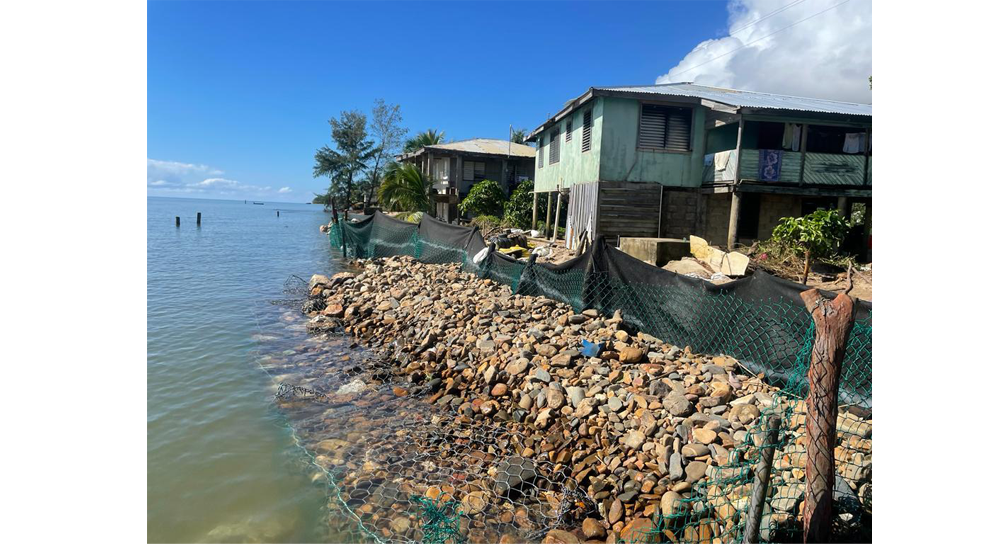by Jasmine Anderson
Monkey River, Thurs. May 25, 2023
In an old notebook with the cover torn off and the pages permanently rolled into the shape of a cylinder, my grandmother has written down her childhood memories of Monkey River Town. I imagine the book got its shape from being constantly rolled and bent to fit handbags and dress pockets for easy access whenever she felt the urge to write. It is almost impossible to imagine the small fishing community that exists today, as the thriving town that my grandmother recreates from memory.
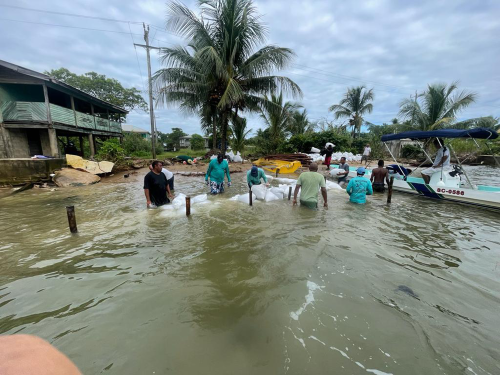
Monkey River is one of the oldest southern settlements in the country. It was a busy, bustling, banana town in the time when my grandmother was a child. From her memories, Monkey River seems both different and the same — same howler monkeys, but different landscape.
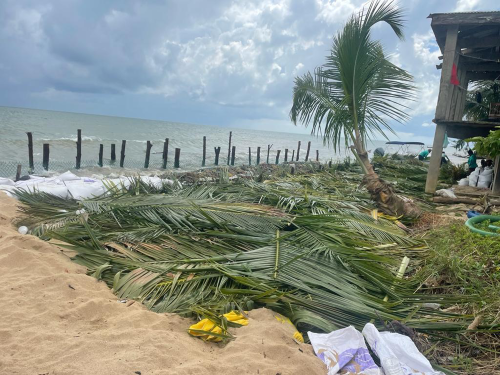
Jestine Elizabeth Anderson was born in 1940 amidst the first full year of the second World War. The world was changing fast, and those shifts could be felt and seen all the way in her little coastal reality. In pale blue ink, she writes that one of her earliest memories is of two ships, one named Desire and the other Lindonia, that used to come to the town to carry away the bananas. The banana industry was prosperous during the early 20th century, and Monkey River was at the heart of it. At some point in her early childhood, she recalls that at first the ships were both white but were soon repainted in grey. When she had asked out of curiosity why the ships had been repainted, she was told that it was to make them less visible to submarine crews who could spot and torpedo them. The ships normally travelled from Central America and the Caribbean to the United States and Europe. The war was impacting everything, everywhere. She recounted that it was not long after the war started that the United Fruit Company stopped its operations, and her Monkey River community began to fall on hard times. The images that my now 83-year-old grandmother is able to revive are amazing. From the days of her early childhood until she was 14 years old, Monkey River seemed to include families, industry, purpose, and beautiful strips of sandy beaches that served the entire community.
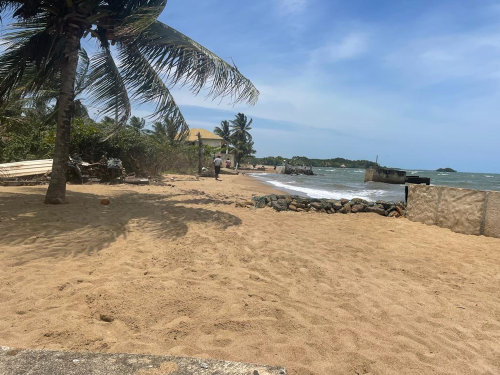
On May 21st 2023, a small group gathered at Monkey River Village to talk about their memories and their hope. They shared memories of what the village’s coastline used to look like, and how it has now eroded to the point that residents were being told that relocation may be the only viable option. They spoke with hope, now that their beach has been restored by local community members. It has been restored through sheer will and determination, using the resources that nature has always supplied. Eworth Garbutt and his group of community-loving, Silk-Cayes-saving, and neighbour-caring members have spent the last seven months quietly rebuilding the Monkey River beach. Many told them that it was an impossible mission and that they would only be wasting people’s time. That doubt was used to fuel their determination, because as Eworth likes to say, “Horse power and engine power are good, but human power is the best—nothing can stop it!”
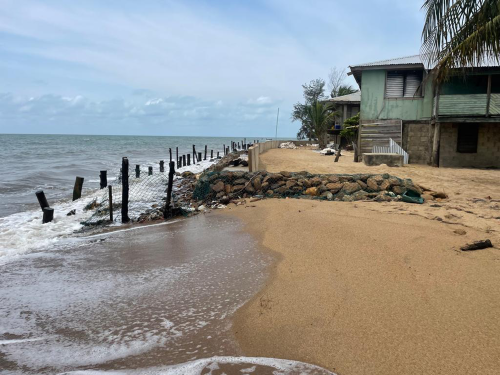
That morning, we all boated over to Monkey River for an official ceremony in honour of the work they had recently accomplished. Work that was already benefiting the people of Monkey River. The group included residents from Placencia, Independence, Punta Gorda and other districts. I was among them.
Last year, I was on the same boat with many of the same people. That time we were heading to the Silk Cayes. Last year was the first time that Eworth Garbutt and the community decided to take action and do what they could to save what they say is theirs and what is for all of us. A year later, the sand bags, coconut leaves, and rocks are still keeping the Silk Cayes intact. The transformation at the Caye has only improved. No person looking at that island today would be able to imagine that just last year the island was down to one coconut tree and nearly 99% of it was submerged under water. Good thing there are the pictures to prove it. That island stands today as a symbol of the group’s power and prowess. Their methods are unconventional by many standards, and perhaps a bit too simplistic for some professional minds, but nobody can deny that the method worked.
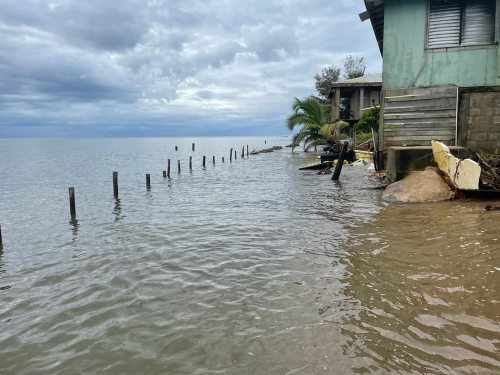
Despite the doubts and the naysayers, Eworth and his group have risen to the occasion again, and this time the Monkey River beach is what rose with them. After seven months, 8,100 square feet of Monkey River’s total beach area has been recovered. When we left Eworth’s dock in Placencia that morning, we paused for a prayer before the boat took off. The wind was calm, the water was flat, and the sky was blue. A perfect day. As we got close, my mother recounted her own memories of English Town, which is a community about a mile north of the river. The boat slowed, and we could see small children playing on the sand and swimming in the sea. A normal scene by all measures, but since they would not have been able to do that for the last decade, the scene was extraordinary. Children could swim and play on the beach again, because there is a beach again. Before the ceremony, we all took a tour up the river. Two tour-guides from the village accompanied us for a top-class excursion experience of the area. A short hike through the forest proved to be even more interesting. Howler monkeys slept on branches of giant Emery trees. There were plants, birds, bats, insects, etc. and the guides knew all of them and they even recounted the names and the traditional medicinal uses of each one. They are proud people and even prouder of their community.
Once we got back to the village, the imagery described in my grandmother’s old notebook filled my mind. This village was declared a town in 1891 when banana was king. It was remade into a village again in 1981. This village has a truth story and it has historical depth that more Belizeans should know about. Once the ceremony started, it was easy to understand why Eworth Garbutt and his crew spent laborious hours moving rocks, lifting sacks of sand, and moving palm leaves. The sand came back, and it came back high. Homes that were being threatened by the erosion were saved, and an entire community, that was about to be displaced, can now stay put. These days, Monkey River residents earn their living from fishing and tourism. You can only imagine what having their beach back means to their economy and livelihood, not to mention their dignity and pride.
The Silk Cayes would have been completely washed away by now. Similarly, Monkey River has been washing away for years, one home at a time. Today, they both remain, glued back together by rocks, sand, palm trees, a little concrete, and a whole heck of community love.
Juxtaposed with Eworth Garbutt and his team’s incredible work are all the academically correct and professionally opinionated things that they should have waited on. Had they waited, several more homes in Monkey River would have been lost by now. Had they waited, in the case of the Silk Cayes, we would only be visiting the island on pictures – thinking of it in past tense as one more example of what climate change took from us. Eworth and his team understand climate change, but they also believe in using nature as the best means of climate resilience.
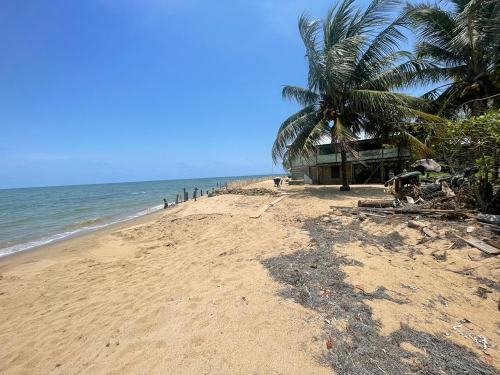
It has been suggested that their effort is like the story of Sisyphus, who eternally rolls his boulder up a hill, only to have it roll back down when he gets close to the top. This is to suggest that Eworth and his team have not solved the issue, but have only paused what is inevitable. In that Greek story, Hades is the one to punish Sisyphus for cheating death twice. Has Eworth Garbutt and his group cheated climate change twice already? I doubt it. Climate change is real, but talking about it is not the answer. Twice already their work has proven that the boulder has to be moved, even if we know it will roll back again and again. Maybe in the interim, better minds will think of better solutions. Until then, keep on rolling that boulder, Eworth Garbutt—your community has your back.

